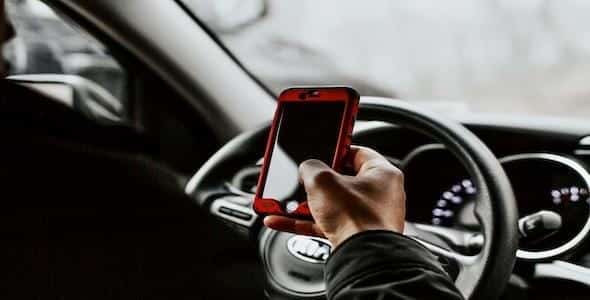While we take our first driving course, we’re told to always keep our eyes on the road and to watch out for other drivers who may make mistakes on the road. After we have some practice and experience under our belt, we become more comfortable behind the wheel. However, our priorities and attention can shift from the road to other distracting activities. We think we can multitask while driving and get away with a quick text message or briefly looking down to change the radio tuner and the air conditioner. Unfortunately, the risk involved in this distracted driving activity is higher than people think.
What Is Distracted Driving?
You can be distracted while driving doing anything behind the wheel of a car that takes away your mind or eyes off the road or your hands off the wheel. The distracted driver definition is any thought or action that distracts your focus away from the road and driving.
Did you know it takes full 3 seconds to shift your attention back to your primary task of driving after a distraction? It might appear short, but when traveling at a high rate of speed or need to anticipate what other drivers are doing on the road, those seconds are extremely important. Do you understand the danger in distracted driving?
Three Main Types of Distracted Driving
It is estimated 8 people are killed in the United States everyday due to distracted driving accidents. Distractions are common in everyday life. If you are aware of what is considered distracted driving then you are on your way to taking the first step to avoiding distractions in the car.
Vehicle driver distractions are broken down into three main categories, according to the CDC (Center for Disease Control and Prevention):
- Visual – using eye sight
- Manual – using your hands
- Cognitive – using your mind
VISUAL DISTRACTIONS
Visual distractions are defined as anything which takes your eyes off of the road. For example, if you are checking a text on your phone, looking at your GPS, and looking at a passenger while having a discussion behind the wheel. Keeping your eyes on the road at all times is a crucial part of being an attentive driver.
MANUAL DISTRACTIONS
Driver manual distraction is any activity that involves taking your hands off the steering wheel while driving. For example, if you reach for your cell phone, change your navigation route, or eat food while driving.
COGNITIVE DISTRACTIONS
Driver cognitive distractions is considered any activity which takes your mind off of driving the vehicle. For example, if you are concentrating on a text message or notification that pinged on your cellphone you have taken your mind away from traffic conditions. In some case, even something as seemingly casual like daydreaming is enough to distract your mind from the task of driving.
What Is a Distracted Driver?
A distracted driver is considered the person behind the wheel who is not paying full attention and focus on the task of driving. As in the examples above, a distracted driver can have active or subconscious distraction while driving.
WHAT IS DISTRACTED DRIVING: AWARENESS OF DISTRACTIONS
Distraction while being a driver of a motor vehicle are even more dangerous when two or more types of distracted driving activity is combined in the examples given above. For instance, texting as you drive combined with any of the three types of distracted driving: reading a text and/or your response (visual), putting on makeup, the action of texting (hands off the wheel), and thinking of the text and response (cognitive) all account for distracted driving.
It’s important to remember that there is no such thing as a distraction that is “worse” or “better” than another kind of distraction. Virtually any kind of distraction puts your safety and the safety of passengers and surrounding civilians at risk.
Distracted Driving Examples
Any of these activities can count as distracted driving:
- Putting on makeup
- Eating or drinking
- Reaching for anything in the car or interacting with something in the car
- Talking to other passengers in the car
- Turning head to look in the back seat
- Using earbuds or headphones to listen to music, podcasts, books, or other media
- Being distracted by outside surroundings
- Adjusting your GPS
- Personal grooming
- Navigating maps in vehicle
- Changing car controls: i.e., radio, air conditioner, etc.
- Setting or resetting a navigation system
- Active mental or emotional distract by a stressful job, home life, relationship etc.
- Cellphone use—talking, texting, taking pictures, holding phone to head, accessing the Internet, navigating, reading, watching videos, or listening to music
The Consequences of Distracted Driving
A distracted driver is definitely at a higher risk of a collision. When you don’t pay attention to where you’re going or what other drivers on the road are doing, reacting quickly to dangerous surroundings becomes nearly impossible.
DISTRACTED DRIVING FACTS
According to National Highway Traffic Safety Administration statistics, the consequences of distracted driving are disastrous: over 3,000 people were killed in distracted driving accidents in 2019, which accounted for about 8.7 percent of all fatalities in that year.
Independent research shows that mobile devices like cell phones play a big role in distracted driving crashes. In 2019, the CDC, performed a Youth Risk Behavior Surveillance System survey where 39% of high school students admitted to sending a text or email while driving at least once 30 days before the survey. Tragically, as a result of in vehicle distractions while driving, 9 percent of all teens who died in a car accident were killed because of distracted-driving-related crashes.
After you consider that it takes an average of five seconds to read or respond to a text message, you realize this definitely enough time to travel the length of a football field (at 55 mph). This is the equivalent of driving drunk or blind.
WHAT PERCENT OF DRIVERS TALK ON CELL PHONES?
In 2018, there was an increasing trend of 3.2% of drivers talking on handheld cell phones at any given moment. This translates into an estimated 472,486 drivers in passenger vehicles who were using their phone at any given time during the day. In other words, during the day in 2018, approximately 9.7 percent of all drivers were talking on the phone from either a handheld or hands-free device.
OTHER DISTRACTED DRIVING CONSEQUENCES
To illustrate some of the additional potential consequences associated with distracted driving, you could find the following consequences:
- Fines: in Michigan, civil fine of $100 and $200 for each subsequent offense for using your cell phone while driving
- Criminal Penalty: Negligent homicide
- Driving while distracted ticket
- Court sentences
- Harm to self and others
- Property damage
- and much more
How to Prevent Distracted Driving
Typically, drivers are exposed to many other dangers on the road to deal with. Why add distracted driving to the list road conditions? You, your passengers, other motorists, bicyclists, and pedestrians are at higher risk when you’re on the road distracted. You are responsible to protect them. A few seconds shaved off your perception and reaction time can change someone’s life (and yours) forever, and you can prevent it by staying focused on the task of driving.
Focused on the road is your most important job as a driver. Always wait until it’s safe to pull over to do whatever activity you may need to perform other than driving.
Need To Contact An Automobile Accident Attorney Today?
If you or a loved one have been injured as a result of a car accident, you should seriously consider contacting the auto accident specialists at The Joseph Dedvukaj Firm. A Detroit car accident lawyer from Dedvukaj Law can help you receive the compensation you deserve. Call 1-248-352-2110 or fill out the online contact form below for a free, no-obligation case evaluation.


